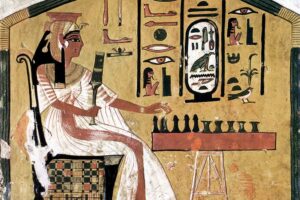In 507 BC the politician Cleisthenes introduced a new form of government in Athens: democracy. This ancient democracy resembled the political system of today, albeit to a very limited extent.
One of the main differences was that only adult, free men who had served in the military for at least two years were allowed to make political decisions.
This meant that only men over twenty had the right to participate in politics, and that women, slaves and foreigners were completely ineffective.
This meant that Athens was ruled by only 15% of the population.
Who participated in the Athenian democracy?
Slaves (approx. 60%)
Up to 150,000 of the 250,000 who lived in Athens were slaves without any political rights.
Foreigners (approx. 5%)
Foreigners were welcome to settle in Athens, but were not allowed to own land or take part in politics.
Citizens without the right to vote (approximately 20%)
Women, as well as men under twenty, had no influence in the field of politics in Athens.
Men with voting rights (approximately 15%)
All political decisions were made by full-grown, free men who had been trained as soldiers.
As we know today, the citizens elect politicians to work for the interests of the voters, but in ancient Greece, on the other hand, men had the opportunity to make their own decisions in the field of politics – including in the National Assembly, which convened 40 times a year.
All participants enjoyed freedom of speech and had the right to vote when laws were passed. A total of 500 men were chosen at random to work in the council that was in charge of the day-to-day running of Athens.
Last but not least, 500 men were elected to the National Court, which convened 200 times a year to settle disputes and criminal cases.
The Macedonians abolished democracy in Athens in 322 BC.






